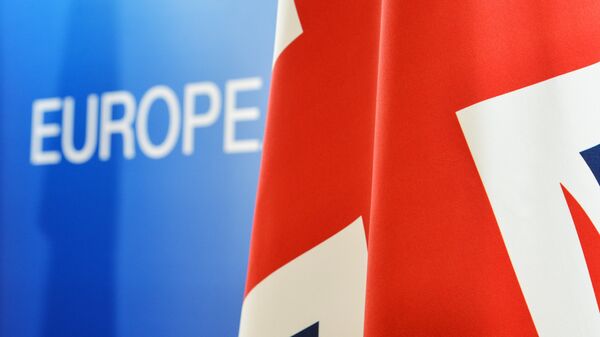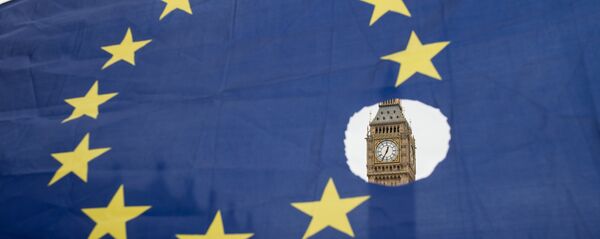MOSCOW (Sputnik) – The United Kingdom intends to pursue new trade negotiations with other countries during the proposed transition period after leaving the European Union, the UK government’s white paper on trade, released Monday, reads.
"The UK would intend to pursue new trade negotiations with others during the implementation period, having left the EU, though we would not bring into effect any new arrangements with third countries that were not consistent with the terms of our agreement on an implementation period with the EU," the paper reads.
Britain will seek to transition all existing EU trade and preferential arrangements as it prepares to leave the European Union, the UK government's white paper said.
"As we prepare to leave the EU, we will seek to transition all existing EU trade agreements and other EU preferential arrangements. This will ensure that the UK maintains the greatest amount of certainty, continuity and stability in our trade and investment relationships for our businesses, citizens and trading partners," the paper reads.
One of the key objectives of the United Kingdom in its post-Brexit trade policy is to ensure that the EU-UK trade remains as smooth as possible, the UK government said on Monday in its white paper on trade issues.
"The Government will be guided by what delivers the greatest economic advantage to the UK and by three strategic objectives: ensuring UK-EU trade is as frictionless as possible; avoiding a ‘hard border’ between Ireland and Northern Ireland; and establishing an independent international trade policy," the policy paper said.
Customs
The new British customs bill will give the government the ability to operate as a standalone customs regime if Brexit negotiations with the European Union were to fail and the United Kingdom left the bloc without an agreement, the UK government’s white paper reads.
"In addition to providing for most negotiated outcomes, the Customs Bill will give the government the ability to operate a standalone customs regime and ensure that VAT and excise legislation operates effectively, if the UK were to leave the EU without a negotiated settlement. Leaving the EU without a negotiated settlement is not the government’s preferred outcome, but it is essential that the UK is prepared for all possible outcomes on customs, VAT and excise arrangements," the document reads.
Laws
The United Kingdom will keep the UK laws as consistent as possible with the European Union’s laws as it leaves the bloc, the UK government said.
"As the UK leaves the EU, the government will keep UK law as consistent as possible with EU law, responding to business requests for continuity and certainty. In the longer term, and depending on the outcome of the negotiations with the EU, the government will want to consult on possible changes to this law that will help UK businesses, but now is the time to help businesses by providing continuity with the existing rules where possible," the document reads.
Meanwhile, UK Prime Minister Theresa May said Monday she did not believe that the deal on the United Kingdom leaving the European Union would be negotiated by the end of the two-year period set aside for it.
"We will not have negotiated that deal, I suspect, close to the end of the period that has been set aside for it," she said speaking in the House of Commons.




